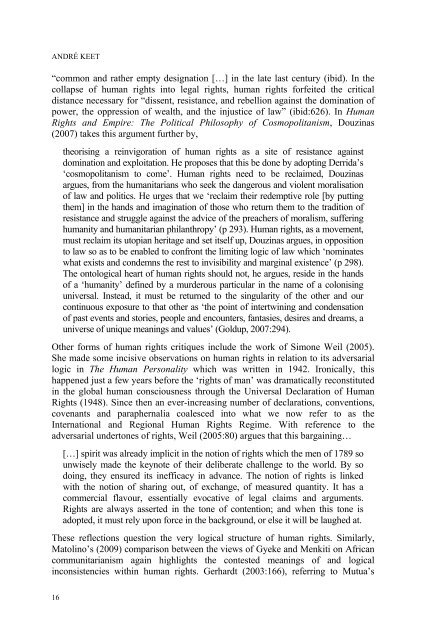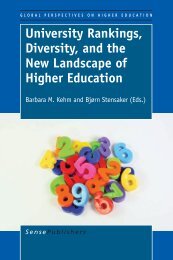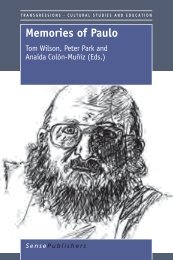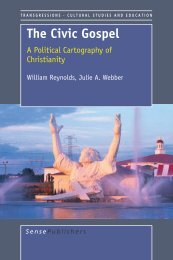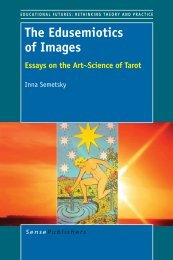Safe Spaces Human Rights Education in Diverse Contexts
Safe Spaces Human Rights Education in Diverse Contexts
Safe Spaces Human Rights Education in Diverse Contexts
You also want an ePaper? Increase the reach of your titles
YUMPU automatically turns print PDFs into web optimized ePapers that Google loves.
ANDRÉ KEET<br />
“common and rather empty designation […] <strong>in</strong> the late last century (ibid). In the<br />
collapse of human rights <strong>in</strong>to legal rights, human rights forfeited the critical<br />
distance necessary for “dissent, resistance, and rebellion aga<strong>in</strong>st the dom<strong>in</strong>ation of<br />
power, the oppression of wealth, and the <strong>in</strong>justice of law” (ibid:626). In <strong>Human</strong><br />
<strong>Rights</strong> and Empire: The Political Philosophy of Cosmopolitanism, Douz<strong>in</strong>as<br />
(2007) takes this argument further by,<br />
16<br />
theoris<strong>in</strong>g a re<strong>in</strong>vigoration of human rights as a site of resistance aga<strong>in</strong>st<br />
dom<strong>in</strong>ation and exploitation. He proposes that this be done by adopt<strong>in</strong>g Derrida’s<br />
‘cosmopolitanism to come’. <strong>Human</strong> rights need to be reclaimed, Douz<strong>in</strong>as<br />
argues, from the humanitarians who seek the dangerous and violent moralisation<br />
of law and politics. He urges that we ‘reclaim their redemptive role [by putt<strong>in</strong>g<br />
them] <strong>in</strong> the hands and imag<strong>in</strong>ation of those who return them to the tradition of<br />
resistance and struggle aga<strong>in</strong>st the advice of the preachers of moralism, suffer<strong>in</strong>g<br />
humanity and humanitarian philanthropy’ (p 293). <strong>Human</strong> rights, as a movement,<br />
must reclaim its utopian heritage and set itself up, Douz<strong>in</strong>as argues, <strong>in</strong> opposition<br />
to law so as to be enabled to confront the limit<strong>in</strong>g logic of law which ‘nom<strong>in</strong>ates<br />
what exists and condemns the rest to <strong>in</strong>visibility and marg<strong>in</strong>al existence’ (p 298).<br />
The ontological heart of human rights should not, he argues, reside <strong>in</strong> the hands<br />
of a ‘humanity’ def<strong>in</strong>ed by a murderous particular <strong>in</strong> the name of a colonis<strong>in</strong>g<br />
universal. Instead, it must be returned to the s<strong>in</strong>gularity of the other and our<br />
cont<strong>in</strong>uous exposure to that other as ‘the po<strong>in</strong>t of <strong>in</strong>tertw<strong>in</strong><strong>in</strong>g and condensation<br />
of past events and stories, people and encounters, fantasies, desires and dreams, a<br />
universe of unique mean<strong>in</strong>gs and values’ (Goldup, 2007:294).<br />
Other forms of human rights critiques <strong>in</strong>clude the work of Simone Weil (2005).<br />
She made some <strong>in</strong>cisive observations on human rights <strong>in</strong> relation to its adversarial<br />
logic <strong>in</strong> The <strong>Human</strong> Personality which was written <strong>in</strong> 1942. Ironically, this<br />
happened just a few years before the ‘rights of man’ was dramatically reconstituted<br />
<strong>in</strong> the global human consciousness through the Universal Declaration of <strong>Human</strong><br />
<strong>Rights</strong> (1948). S<strong>in</strong>ce then an ever-<strong>in</strong>creas<strong>in</strong>g number of declarations, conventions,<br />
covenants and paraphernalia coalesced <strong>in</strong>to what we now refer to as the<br />
International and Regional <strong>Human</strong> <strong>Rights</strong> Regime. With reference to the<br />
adversarial undertones of rights, Weil (2005:80) argues that this barga<strong>in</strong><strong>in</strong>g…<br />
[…] spirit was already implicit <strong>in</strong> the notion of rights which the men of 1789 so<br />
unwisely made the keynote of their deliberate challenge to the world. By so<br />
do<strong>in</strong>g, they ensured its <strong>in</strong>efficacy <strong>in</strong> advance. The notion of rights is l<strong>in</strong>ked<br />
with the notion of shar<strong>in</strong>g out, of exchange, of measured quantity. It has a<br />
commercial flavour, essentially evocative of legal claims and arguments.<br />
<strong>Rights</strong> are always asserted <strong>in</strong> the tone of contention; and when this tone is<br />
adopted, it must rely upon force <strong>in</strong> the background, or else it will be laughed at.<br />
These reflections question the very logical structure of human rights. Similarly,<br />
Matol<strong>in</strong>o’s (2009) comparison between the views of Gyeke and Menkiti on African<br />
communitarianism aga<strong>in</strong> highlights the contested mean<strong>in</strong>gs of and logical<br />
<strong>in</strong>consistencies with<strong>in</strong> human rights. Gerhardt (2003:166), referr<strong>in</strong>g to Mutua’s


